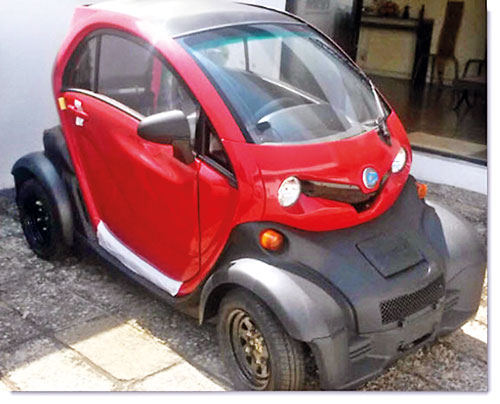Quadricycle faces hurdle in Sri Lankan entry
View(s):
Quadricycle
Sri Lanka yet to decide on allowing an all-electric quadricycle to run on local roads, at a time when air pollution and traffic congestion have reached alarming levels in the city of Colombo.
The Department of Motor Traffic (DMT) is yet to grant permission to the Bajaj RE60 Quadricycle which has been seeking approval since 2015, due to concerns over its safety aspects, officials said.
It is a four-wheeled vehicle with a weight not more than 400kg (excluding batteries of an electric vehicle) and whose maximum continuous rated power does not exceed 15 kW. The widely known quadricycle is the G-Wiz.
While DMT officials assert that such cars are not suited for Sri Lankan roads, local transport and logistics experts say these vehicles are categorized as mopeds in the European Union and deemed as roadworthy not limiting them to ‘beaches and hotels’.
The local agent for the RE60 vehicle has requested the DMT to register it under a different category, but no decision has been taken towards this end as it needs to create a new category for this vehicle and change the Motor Traffic Act accordingly, which has to be done with the approval of the Cabinet of Ministers, an official of the department said.
However, the EU incorporated quadricycles in 1992 by publishing Directive 92/61/EEC which considered that those vehicles fell into the same category as mopeds, not having to create a new category of vehicles.
Rejecting DMT’s claims of safety issues, promoters of electric quadricycles say these vehicles are designed to operate in urban areas at low speeds.
The fact that these vehicles are lighter than conventional cars makes them less of a risk to pedestrians and less damaging to the road surface, they added.
It has two seats in tandem but it’s not a bike. It has four wheels but it doesn’t fit in the car category either. However what is important is not to find a category for this vehicle but to encourage such concepts at a time when air pollution and traffic congestion have reached alarming levels, they pointed out.
A foreign promoter who is keen to introduce electric quadricycles to Sri Lanka as a solution to heavy traffic congestion and air pollution in the city of Colombo told the Business Times that this vehicle could be used to transport single passengers entering the city in cars from common parking places located in an area with some distance away from the city of Colombo.
He pointed out that in the Western Province alone six million people make 10 million trips on a daily basis contributing to the traffic congestion being experienced. In fact according to the Traffic Police around 510,000 vehicles enter Colombo city alone, daily.
Private vehicles taking up road spaces have become a major problem in the city, he said, adding that minimizing such number of vehicles would result in saving time and thereby preventing a severe strain on the economy.
He noted that he cannot understand why the Sri Lankan authorities are not permitting the registration of electric quadricycles in the island.
He revealed his bitter experience when he brought down an electric quadricycle from the time of its entry at the port and up to now.
It took nearly three months for him to clear the vehicle from Sri Lanka Customs in early 2016 after paying 50 per cent tax although the government has reduced the tax on electric vehicles to 5 per cent.
He said that he has sent dozen of letters and appeals to Ministry of Finance, Customs and Ports Authority to clear his quadricycle which is lying unused at his residence as the MTD has refused registration.


